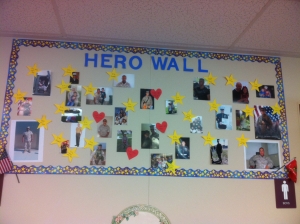New Books Guide Schools in Supporting Military Families
September 10, 2012 / by Maya Meinert- Research
The Building Capacity in Military-Connected Schools project, a partnership between the USC School of Social Work and eight public school districts working to create sustainable models of supportive schools, will release four guidebooks Oct. 1 with the goal of bridging the military and civilian divide in K-12 schools.
The books, which will be published by Teachers College Press at Columbia University and the Military Child Education Coalition, are each written for different audiences: parents, teachers, principals and pupil personnel. The purpose of the books is to empower staff, students and parents to use evidence-based practices to improve school climate for students from military families. These children sometimes feel out of place in the classroom because they have different life experiences from their civilian counterparts.
“A lot of public schools don’t see the military families as a culture,” said Ron Avi Astor, a professor at the School of Social Work and Rossier School of Education and principal investigator on the Building Capacity project. “This allows educators and social workers to understand them as a cultural diversity group and open the discussion about how this can be addressed in schools.”
The School Administrator’s Guide for Supporting Students from Military Families, The Teacher’s Guide for Supporting Students from Military Families, The Pupil Personnel Guide for Supporting Students from Military Families and The Military Family’s Parent Guide for Supporting Your Child in School fill a gap in educational and training programs that will equip principals, teachers, school staff and parents with skills to support this group of students that has been largely overlooked by the public education system.
“The content is evidence-based, but it’s written in a way that’s accessible,” Astor said. “We want these guides to be picked up in teacher and social work training courses so that people get this information as part of their education, before they get out and start practicing.”
By writing separate guides for each audience, the Building Capacity team, which includes co-principal investigators Marleen Wong, clinical professor and assistant dean of field education at the School of Social Work, and Rami Benbenishty, professor of social work at Bar-Ilan University in Israel, put itself in the shoes of the different people to use the right voice, angle and terminology for each group. How teachers work with students, how parents talk to their children, how school social workers talk to students and how principals work with their staffs are all different and require specific direction.
Response to the guidebooks has been hugely positive. Thousands of pre-orders have been made, mainly from university programs and organizations serving military families.
The books have been positively endorsed by leading education experts and professional organizations, including the American Association of Colleges for Teacher Education; William Tierney, USC professor and president of the American Educational Research Association; U.S. Navy Region Southwest School Liaison Officer Program; National Military Family Association; and Paula Allen-Meares, chancellor of the University of Illinois at Chicago and a leading national school social worker.
The guides are the product of the Building Capacity project, a four-year, $7.6 million effort funded by the Department of Defense Education Activity. In partnership with eight school districts near the U.S. Marine Corps base Camp Pendleton in Southern California, the project, which encompasses approximately 117,000 students, 10 percent of whom are military, focuses on improving the climate of civilian schools to be more welcoming of military children and parents and supportive during the frequent transitions these families face. The project also trains Master of Social Work students to serve as interns in military-connected schools.
All royalties from the sale of the books will be donated to military children's educational causes.
“There aren’t many vetted resources available to universities and public school districts on this topic,” Astor said. “Some of this work hasn’t been readily available to practitioners. By pulling together policy, experiences from the field and our research analyses, we can now look at the whole picture. The books present best practices.”
Detailed descriptions of the guidebooks can be found on the Building Capacity website.
To reference the work of our faculty online, we ask that you directly quote their work where possible and attribute it to "FACULTY NAME, a professor in the USC Suzanne Dworak-Peck School of Social Work” (LINK: https://dworakpeck.usc.edu)
